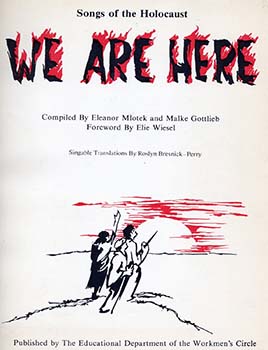Words are by Mordkhe Gebirtig Gebirtig (see note about author in Es Brent), who wrote the poem in Lagevnikiin May, 1941. Music is by Emil Gorovets (b. 1926), Soviet Yiddish singer and composer who emigrated to the United States in 1974.

Once I had a home to comfort me
And made a living as a poor man should.
My roots were tightly wound around a tree,
In poverty lived there as best I could.
They came with malice, hatred and with death,
And took the humble house that once was mine.
The years I spent to build it, in one breath,
To rubble smashed it in a moment ‘s time.
Once I had a place to eat, a house
So quietly lived there for many years.
And there I had good comrades all about,
A house that overflowed with song and cheer.
And then they came along, a plague of pests,
They chased me from my town with wife and child.
Left without a home, without a nest,
Not knowing why or what I had defiled.
Once I had a home, pain’s left for me.
My ruin was their ultimate design,
To find another home how hard to see
Where to go or for how long a time.
Gehat hob ikh a heym, a shtikl roym.
A bisl virtshaft, vi bay oreme layt.
Tsugebundn vortslen tsu a boym
Hob ikh mikh mit mayn bisl oremkeyt.
Gekumen zaynen zey mit has un toyt,
Mayn orem shtikl heym vos ikh farmog.
Vos ikh mit mi hob yorn lang geboyt,
Farnikhtet hobn zey dos in eyn tog.
Gehat hob ikh a heym, a shtibl un a kikh,
Un shtil gelebt azoy zikh yorn lang,
Gehat fil gute fraynd, khaveyrim arum zikh,
A shtibl ful mit lider un gezang.
Gekumen zaynen zey, vi kumen volt a pest,
Aroysgeyogt fun shtot mit vayb un kind,
Geblibn on a heym vi feygl on a nest,
Nisht visndik far vos, far velkhe zind?
Gehat hob ikh a heym, itst hob ikh zi nisht mer.
A shpil geven far zey mayn untergang —
Ikh zukh itst a naye heym, nor shver, oy zeyer shver,
Un kh’veys nisht vu — un kh’veys nisht af vi lang.
געהאַט האָב איך אַ הײם, אַ שטיקל רױם.
אַ ביסל װירטשאַפֿט, װי בײַ אָרעמע לײַט.
צוגעבונדן װאָרצלען צו אַ בױם
האָב איך מיך מיט מײַן ביסל אָרעמקײט.
געקומען זײַנען זײ מיט האַס און טױט,
מײַן אָרעם שטיקל הײם װאָס איך פֿאַרמאָג.
װאָס איך מיט מי האָב יאָרן לאַנג געבױט,
פֿאַרניכטעט האָבן זײ דאָס אין אײן טאָג.
געהאַט האָב איך אַ הײם, אַ שטיבל און אַ קיך.
און שטיל געלעבט אַזױ זיך יאָרן לאַנג,
געהאַט פֿיל גוטע פֿרײַנד, חבֿרים אַרום זיך,
אַ שטיבל פֿול מיט לידער און געזאַנג.
געקומען זײַנען זײ, װי קומען װאָלט אַ פּעסט,
אַרױסגעיאָגט פֿון שטאָט מיט װײַב און קינד,
געבליבן אָן אַ הײם װי פֿײגל אָן אַ נעסט,
נישט־װיסנדיק פֿאַר װאָס, פֿאַר װעלכע זינד?
געהאַט האָב איך אַ הײם, איצט האָב איך זי נישט מער.
אַ שפּיל געװען פֿאַר זײ מײַן אונטערגאַנג —
איך זוך איצט אַ נײַע הײם, נאָר שװער, אױ זײער שװער,
און כ׳װײס נישט װוּ — און כ׳װײס נישט אױף װי לאַנג.
Song Title: Gehat Hob Ikh a Heym

Compiled by sisters Malke Gottleib and Chana Mlotek, this collection of 40 songs, issued on the occasion of the 40th anniversary of the Warsaw Ghetto Uprising, reflects the suffering, despair, longing, as well as the strength, hope and courage that led the last remnant of enfeebled Jews to take up arms against the mammoth Nazi war-machine. Save for five songs, this compilation comprises songs that were actually written or sung in the ghettos and concentration camps. Four exceptions written after the war: “Babi Yar,” “Moyshelekh un Shloymelekh,” “Kadish,” and “Mayn mame hot gevolt zayn oyf mayn khasene” are often presented at commemorative gatherings and were therefore included. The fifth song “Am Yisroel Khay” was written in a D.P. camp and is an affirmation of the will of the survivors to build new lives for themselves, holding high their belief in the endurance of the Jewish people. To enable readers and singers not conversant with the Yiddish alphabet to utilize this collection, We Are Here! Songs of the Holocaust provides parallel transliterations and singable English translations by Roslyn Bresnick Perry.